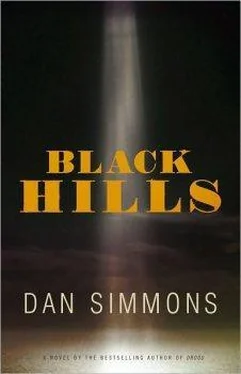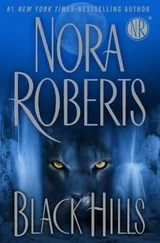Paha Sapa remembers the sight of the tiyospaye on the move, usually with several other bands for safety’s sake, the warriors ranging ahead on their ponies, the old men and the women walking, the younger children playing and ranging wide to either side of the march, the travois being pulled by the older nags and dogs. Often they would come to a grassy hilltop and see thousands of buffalo stretching off for miles. Other times they would cross a rise to see a mountain range in the mists of distance, knowing that those white peaks in summer would be their destination soon. There were no boundaries to the world of the Ikče Wičas´a then….
“It’s because you murderous Sioux had killed or chased out all the other tribes.”
Paha Sapa stops in surprise. The voice in his head is louder than usual.
— I thought you’d gone away.
“Where would I go? Why would I go? And why are you going where you’re going? Not for me, I hope. It makes no difference to me where you end things.”
— I’m doing nothing for you, Long Hair.
Custer’s irritating laughter echoing in his head, Paha Sapa glances over his shoulder to make sure that none of the local Northern Cheyenne are watching him talking to himself. There is only a single black cow on a nearby hill, watching with that placid, stupid, trusting expression that can only be called bovine.
“Well, good. We were talking about how you Sioux, you peace-loving Sioux who, I’m sure historians will soon be saying if they aren’t already, fought only to defend their lands and families, used to go to war against everything that moved on two legs. And killed everything with four legs as well. Your warfare was as indiscriminate as your old habit of driving hundreds of buffalo off a cliff to enjoy a liver or two.”
It is true, Paha Sapa thinks. He has to smile. The Indian’s enemy, this enemy, knows them—knew them—better than do their wasichu so-called intellectual friends. Every spring and summer and fall, the warriors in Angry Badger’s tiyospaye would paint themselves and ride out to go to war for no more reason than it was time to go to war. A Natural Free Human Being male without someone to fight was simply not a natural free human being. Warring against other tribes and against strangers sometimes seemed necessary, but if it wasn’t necessary, which it so often wasn’t, the fighting would have been pursued anyway. It was necessary for its own sake. It was a break from the women and their talk and the smells and sounds and banality of life in the village, in the lodge, that almost all men looked forward to. It was a test of courage and fighting ability that could be found nowhere else. Most of all, of course, it was fun.
But even as Paha Sapa acknowledges these things to himself, he realizes that Custer is not finished with his rant.
“When the Army called your leaders to that first peace powwow at Fort Laramie in eighteen fifty-one, you Sioux kept talking about territory you’d owned forever but which in reality you’d just taken away from the Arikara and Hidatsa and Mandan on your way west from Canada and Minnesota. You bragged about territory that had belonged to you forever but which really had belonged to the Crows and Pawnee just a few years earlier. You Sioux were a ruthless, relentless invasion machine.”
— We didn’t take all the land away from the Cheyenne.
“Not for want of trying, my red friend. Besides, you liked teaming up with the Cheyenne and Arapaho to kill the Pawnee and the Ponca and Oto and Missouri, all the weaker tribes.”
— They were weak. They deserved to die or lose their lands. That was the thinking then.
“It still is, Paha Sapa. At least among us whites. Look at that Hitler fellow you were reading about when we went to New York three years ago. He knows the price of weakness—his and his enemies’ both. But your so-called Natural Free Human Beings have lost the balls to live and die that way—through your own courage, taking what you want from those too weak to keep it. You’re all fat, slow reservation Indians now, wearing cowboy hats, working for wasichus , and waiting for handouts.”
Paha Sapa has no reply to that. He thinks of his own decades working for the Fat Takers. He thinks of the brash, ambitious, confrontational energy that Gutzon Borglum exudes, breathes in and exhales, and that he knows in none of his own kind any longer, including himself.
“When Mitchell and Fitzpatrick called that original eighteen fifty-one meeting at Fort Laramie, they had to deal with the Cheyenne who killed and scalped two Shoshones whom the Cheyenne had specifically given safe passage to so they could get to the council… ”
The ghost’s voice bores on like one of the pneumatic steam-powered drills that Paha Sapa has listened to most days of his life through the past five years.
“So when Mitchell helped calm things down and convinced the Cheyenne to say they’re sorry and to pay the Shoshones their blood price of knives and blankets and tobacco and colored cloth—all stuff the Cheyenne had received from the whites as bribes just weeks earlier—the Cheyenne couldn’t help but insult the Shoshones again at the peace banquet by serving boiled dog.”
Paha Sapa has to smile.
— Yes, the Shoshone never developed a taste for dog.
“But you did, didn’t you, my friend?”
Paha Sapa remembers well the feasts when he was a boy and the joy of spooning through the kettle with the other boys, searching for the dog’s head. It was a delicacy. Just the memory makes him salivate.
“Eaten any of your neighbors’ puppies in Keystone recently, Paha Sapa?”
— What are you doing, Long Hair? Trying to make me angry?
“Why would I do that? And what are you going to do if I am trying to provoke you… shoot me? Speaking of which, why the Little Big Horn? Why not here? One Montana river or creek is as good as another, isn’t it? And this way at least someone will get the use of the motorcycle. Old Mr. Strange Owl looks like a nice fellow to me… for a Northern Cheyenne, I mean. That greedy old bastard was probably there at the Little Big Horn as a greedy young bastard, fighting alongside your relatives and stealing from my brothers’ mutilated bodies on the day you all killed me.”
Paha Sapa realizes that the ghost is trying to make him angry. He has no idea why.
The ghost-voice continues.
“I have a question for you, Mr. Black Hills. Why didn’t you self-proclaimed Natural Free Noble Human Beings When Others Aren’t Human At All ever rub out—or try to rub out—the Nez Percé or Flatheads or Ute or Plains Cree or Piegan or Bannock or Blackfoot?”
— All the others were too far away or too high in their mountains—although we did try to wipe out some of them—but the Blackfoot are just too tough. They’re scary people, Long Hair. The men will kill you just to take your teeth to gamble with, rolling them on a blanket like dice, and the women will chop off your ce and hang it on their lodge pole as a children’s toy.
The ghost laughs again.
Paha Sapa returns to the campsite, folds up the dry tarps, closes his valise, and walks back to the town of Busby.

HE’S ON THE ROAD by midnight.
Poor Tommy Counts the Crows, assigned by Mr. Strange Owl to make sure that Paha Sapa did not steal anything, had fallen asleep by ten p.m. Paha Sapa made sure the tools were returned to their right places and left the young man sleeping, pushing the rebuilt motorcycle a hundred feet down the road before kick-starting it to life.
The electric headlamp was new to motorcycles in 1916 and Paha Sapa has repaired but never replaced the original one on Robert’s machine. The beam it casts is flickery and not very bright at the best of times. On the road headed west tonight, he would have turned it off completely and navigated by moonlight, except that a solid cloud cover has moved in and the moonlight is too diffused to drive by. It’s still bright enough, however, for Paha Sapa to see that the Crow houses he’s passing on either side of the road tend to be tumbledown hovels and shacks… not so very much different, he decides, from the majority of tumbledown hovels and shacks he saw on the Northern Cheyenne reservation or, for that matter, on Pine Ridge and the other Sioux reservations in South Dakota.
Читать дальше













